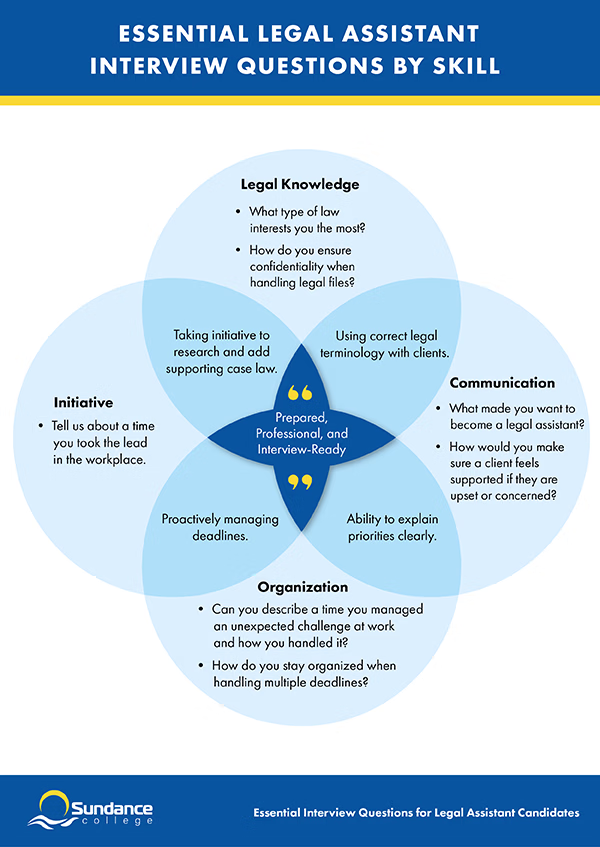Blog / Essential Interview Questions for Legal Assistant Candidates
Essential Interview Questions for Legal Assistant Candidates

Professional Legal Assistant Diploma
- Legal Assistant
- Legal Secretary
- Legal Administrative Assistant
- What type of law interests you the most?
- What made you want to become a legal assistant?
- Can you describe a time you managed an unexpected challenge at work and how you handled it?
- How do you stay organized when handling multiple deadlines?
- How do you ensure confidentiality when handling legal files?
- How would you make sure a client feels supported if they are upset or concerned?
- Tell us about a time you took the lead in the workplace.
Table of Contents
You sit across from the interviewer with your resume neatly placed on the desk. The first question comes, and suddenly your mind goes blank.
Now imagine instead that you already know what legal assistant interview questions to focus on and exactly how to answer them. That kind of preparation can make all the difference.
Here are the top questions you’ll face, how to answer them, and bonus tips to help you stand out in your next legal assistant interview.
Listen to: Essential Interview Questions for Legal Assistant Candidates
Why Interview Prep Matters for Legal Assistant Candidates
Think of job interview preparation the same way you’d prepare case files: Everything needs to be researched, organized, anticipated in advance, and ready to present on-the-spot.
Legal assistant interviews often include questions about how you prepare legal documents, conduct research, communicate with clients and engage with the legal team. These aren’t casual topics: they test whether you understand the responsibilities that come with the role. When you come to an interview unprepared, you risk leaving potential employers unsure that you understand the importance of the work.
Being prepared means having examples at your fingertips that demonstrate your understanding of the legal assistant role and prove that you can apply your skills effectively in any setting.
When applying for legal administration jobs, interview prep can be the difference between getting overlooked and successfully making your case.
7 Legal Assistant Interview Questions
Here are the top 7 sample legal assistant interview questions and answers to have ready before you walk in the door:
1. What type of law interests you the most?

Purpose: This legal interview question is meant to see how well you understand the various areas of law, like real estate, family, corporate, criminal, and energy law.
How to Answer:
- Explain what specifically draws you to this area of law.
- Mention how your coursework or practicum experience reinforced your interest.
- Highlight dedication to this field or willingness to grow in others.
Example:
“I’m drawn to family law because I enjoy helping people navigate personal challenges. During my practicum, I worked on custody cases and saw firsthand how my work could positively impact families.”
2. What made you want to become a legal assistant?
Purpose: To assess your motivation, commitment, and understanding of the role.
How to Answer:
- Connect personal interests with your strengths.
- Reference how your education and practicum experience reinforced your interest in the role.
- Express your long-term interest in contributing to the legal field.
Example:
“I was drawn to becoming a legal assistant because I wanted a career where my organizational skills and attention to detail could make a difference. In my diploma program, I gained skills in drafting documents, managing files, and understanding court procedures. During my litigation practicum, I put those skills into practice by preparing documents, meeting deadlines, and keeping case files organized, which confirmed this is the right career for me.”
3. Can you describe a time you managed an unexpected challenge at work and how you handled it?
Purpose: This question measures how well you adapt to challenges while staying reliable and solution-focused.
How to Answer:
- Use the STAR method:
- Choose a Situation or Task where something unexpected happened during your practicum.
- Explain the challenge clearly, then focus on the Action you took to manage it.
- Highlight how what you did led to a positive Result.
Example:
“During a court filing, a lawyer received new information that required last-minute changes to an affidavit. I quickly updated, reformatted, and reprinted the document in time, helping avoid delays in the case.”
4. How do you stay organized when handling multiple deadlines?
Purpose: This question evaluates your time management skills, which are critical when working on multiple cases at once.
How to Answer:
- Describe how you break large projects into smaller tasks.
- Show how you communicate with supervisors to clarify priorities.
- Make sure to mention organizational tools you use like legal software, Microsoft Outlook calendar, or task lists.
Example:
“I use legal software to manage files, Outlook for deadlines, and a daily handwritten checklist. I learned this during training, and it’s helped me stay on top of overlapping deadlines with ease.”

5. How do you ensure confidentiality when handling legal files?
Purpose: To confirm your understanding of legal file confidentiality and the ethical responsibilities of legal assistants.
How to Answer:
- Stress that you understand that confidentiality is a professional obligation for all legal staff.
- Explain how you maintain confidentiality via secure file handling, phone etiquette, and avoiding disclosure.
- Mention how course assignments like signing a mock confidentiality agreement reinforced these expectations.
- Connect your habits back to the Law Society’s Code of Conduct.
Example:
“In training, we emphasized confidentiality and even signed a mock agreement. It taught me to keep files secure, be careful on calls, and avoid discussing cases outside work. By my practicum, these habits felt natural and aligned with the Law Society’s Code of Conduct.”
6. How would you make sure a client feels supported if they are upset or concerned?
Purpose: Employers ask this to see how you use your communication skills to stay professional, patient, and calm when a client is upset or frustrated.
How to Answer:
- Show that you listen empathetically and let the client express themselves.
- Demonstrate calmness and professionalism.
- Explain how you’d provide reassurance while keeping the lawyer informed.
Example:
“In my practicum, a client was upset about delays. From my Legal Office Procedures course, I learned to listen carefully, reassure them, and offer to follow up. The client felt heard and later recommended the firm to a new client.”
7. Tell us about a time you took the lead in the workplace.
Purpose: The goal of this question is to understand how your training prepared you to take initiative to keep legal work efficient, organized, and client-focused.
How to Answer:
- Share a moment where you took action without being asked.
- Focus on how your initiative solved a problem or saved time.
- Keep it positive, with a clear outcome.
Example:
“In my practicum, I noticed a file had only a few case references. Drawing on my training, I researched additional materials and flagged relevant cases for the lawyer. They praised my initiative and said it made their work better.”
Bonus Tips for Acing Your Interview
There are other ways to help you stand out in an interview. To make a great impression, here are some bonus interview tips legal assistant candidates should consider:
Research the Firm in Advance
Learn about the areas of law they practice and the types of clients they serve. Being able to connect your interests and skills to their focus shows genuine preparation.
Dress in Professional Attire
Wear formal business attire such as a suit or blazer with dress pants or a skirt in neutral colors. Keep accessories simple, grooming neat, and shoes polished.
Mind Your Body Language
Maintain good posture, nod when appropriate, paraphrase questions before answering, and take short notes. These details prove you’re attentive and prepared to handle sensitive instructions.
Ask Role-Specific Questions
Prepare thoughtful questions that show you’re thinking about long-term career growth. Examples include:
- “How do you measure success for a legal assistant at this firm?”
- “Are there opportunities to take on more responsibility over time?”
Follow Up After the Interview
Send a short thank-you email within 24 hours. Reaffirm your interest in the role and mention one point from the interview that excited you.
With the skills and experience from your diploma program and the professionalism these tips highlight, you’ll make a strong impression as a prepared and capable candidate.
How a Professional Legal Assistant Diploma Program Prepares You
What you learn through a Professional Legal Assistant diploma program gives you the evidence you need to make a strong case for yourself in an interview. By developing legal skills through hands-on training and a practicum at Sundance College, you’ll have examples to prove your capabilities.
Practical training in document preparation, legal research, and case management software helps develop your organizational and technical abilities, must-have skills to keep legal processes on track.
A practicum is included in Sundance’s Professional Legal Assistant diploma program so you can apply what you learned from your coursework and strengthen crucial soft skills like communication and organization:
“During the practicum, students handle legal assistant tasks like drafting documents, preparing case files, and supporting lawyers on deadlines. These experiences give them clear examples to bring up in interviews when asked about their skills and training.“ – Amanda M., Professional Legal Assistant diploma program instructor at Sundance College.
By practicing these responsibilities before graduation, students have situations they can draw on to give strong STAR answers in interviews.
Proper interview preparation means you can present yourself as the right fit for the role. By practicing your answers to common questions, you’ll be able to clearly explain why you want to work in law, how you stay organized when things get busy, and how you would handle challenges in a legal office.
With Professional Legal Assistant training from Sundance College, you will have strong examples to draw from. From preparing legal documents for lawyers to using case management software, you’ll be able to pull from actual experiences you had during your practicum.
Before the interview, turn to Career Services. The Career Services team will work with you in mock interviews and one-on-one coaching to turn your examples into strong answers.
By the time you sit down with an employer, you will be prepared to show exactly why you are the right candidate.
Set yourself up for success as a professional Legal Assistant. Sundance College’s diploma program provides practical training, a real-world practicum, and personalized career services to help you achieve your career goals. Connect with an advisor and enroll now!
FAQ
-
What should I wear to a legal assistant interview?
Dress professionally in business clothing like a suit or blazer with pants or a skirt.
-
Can I share practicum experiences during my answers?
Yes, practicum stories are great examples of how you’ve handled tasks, deadlines, or client interactions.
-
Do I need to know legal terminology before the job?
Yes, because knowing key legal terms demonstrates you’re capable of understanding the work you’ll be assisting with.
-
How critical are confidentiality and accuracy in this role?
Both are essential. Law offices rely on legal assistants to protect sensitive information and avoid mistakes, which can prove costly.
-
What technical tools should I highlight?
Mention case management systems, document management programs, and office tools like Word and Excel.
-
How long is the diploma and does it include practicums?
Not long! The legal assistant diploma program is 46 weeks long, including a 5-week practicum.
Related Blogs
Subscribe for more career advice
Blog Categories
Share on:
